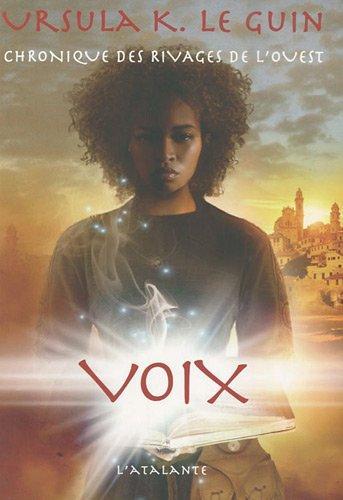lingua French
Pubblicato da L'Atalante.

lingua French
Pubblicato da L'Atalante.
Voices (2006) is the second book in the trilogy Annals of the Western Shore, a young adult fantasy series by Ursula K. Le Guin. It is preceded in the series by Gifts (2004) and followed by Powers (2007). The story is set in the fictional city of Ansul, once famed as a center of learning, but invaded and subjugated by the Alds, a desert people who believe the written word to be evil. The protagonist, Memer Galva, is the child of a woman raped by an Ald soldier. She lives in the house of the Waylord Sulter Galva, who teaches her to read after finding she can enter the house's hidden library. When Memer is seventeen the city is visited by Gry and Orrec, the protagonists of Gifts; Orrec is now a famous poet, invited to perform by the Alds. Their arrival catalyzes an uprising against the Alds, while Memer …
Voices (2006) is the second book in the trilogy Annals of the Western Shore, a young adult fantasy series by Ursula K. Le Guin. It is preceded in the series by Gifts (2004) and followed by Powers (2007). The story is set in the fictional city of Ansul, once famed as a center of learning, but invaded and subjugated by the Alds, a desert people who believe the written word to be evil. The protagonist, Memer Galva, is the child of a woman raped by an Ald soldier. She lives in the house of the Waylord Sulter Galva, who teaches her to read after finding she can enter the house's hidden library. When Memer is seventeen the city is visited by Gry and Orrec, the protagonists of Gifts; Orrec is now a famous poet, invited to perform by the Alds. Their arrival catalyzes an uprising against the Alds, while Memer tries to come to terms with her ability to interpret the Oracle that resides in her house. Voices examines the cultural and religious strife between the monotheistic beliefs of the Alds and the polytheistic practices of the citizens of Ansul. Described as a "plea for cultural relativity", the novel also juxtaposes violent and non-violent means of ending a conflict. As with the other stories of Annals of the Western Shore, Voices examines enslavement and the treatment of women, and the theme of justice. The story traces Memer's coming of age, and the power of words, stories, and writing is a recurring theme. The book received acclaim from critics, who praised its nuanced portrayal of religion and cultural conflict, the characterization of Memer, and Le Guin's writing and detailed world building. Multiple reviewers compared it to Fahrenheit 451 by Ray Bradbury, also prominently featuring the destruction of books. Voices was a finalist for a Locus Award in 2007. Scholar Elizabeth Anderson wrote that the book "[encouraged] young adult readers to imaginatively approach their own encounters with religious difference."